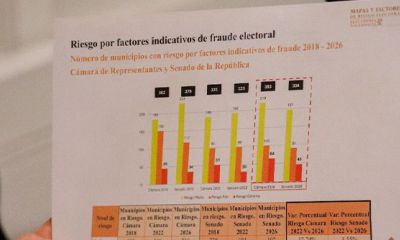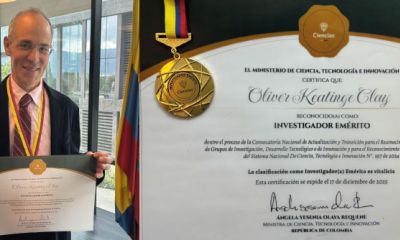
In 2020, due to the pandemic crisis, Universidad del Rosario decided to conduct online classes and this was devastating for students to share interaction learning without classrooms and without presence. The International Affairs Area created international projects that are ahead of the common way of learning and international expectations.
As part of this strategy, COIL (Collaborative Online International Learning) projects were implemented.
These projects consist of a Global Classroom with an experience in which both students and professors from two or more institutions are connected in the same virtual space, either synchronously or asynchronously, for a minimum of three sessions, in which they have close and collaborative contact. COIL is an innovative teaching and learning methodology that takes advantage of online technologies to connect in the same space teachers and students from two or more different institutions at the same time to carry out a joint class, a project, among others.
In 2020, throughout the second semester, we achieved 2 interesting COILS. In which it is worth mentioning them. We will focus on one of them. The COIL project was with a partner university in Germany. The lead professor from UR was Juan Martin and from Mainz University of Applied Sciences was Stephanie Swartz. They had the conference about Interculturality and Negotiation. In this project 40 and 32 students participated respectively.
In accordance with the normal nature of the course, the professors jointly defined and designed the project "Intercultural Communication Activity" for the students to develop together as part of the course. Subsequently, they held two outreach meetings with the participation of students and professors from both institutions. The project was carried out by groups organized on the ‘MS Teams’ platform. The work spaces for the development of the project were also organized by the students themselves.
Following we have some shared experiences by the professors and the students, who participate on this international project:
“The COIL project between the Mainz University of Applied Sciences, Germany and Universidad del Rosario was carried out last winter term 2020 and this spring term 2021. Three graduate students from Pfeiffer University, North Carolina, USA joined the project in the spring term under the supervision of Prof. Susan Luck. The courses took place online or in hybrid form. Some of the students were located elsewhere such as in France or the Netherlands. The teams were very heterogeneous in terms of national and ethnic origin, age and level of English language skills.
I have to say that I have been involved in COIL projects since 2015. I began these projects because I felt my students needed the experiential learning experience of intercultural business communication. Learning the does and don’ts of interacting with people from another culture is not an adequate preparation for real-life. Today’s working world requires skills in intercultural communication, virtual intelligence and digital project management. COIL projects enable students to acquire these skills while at the same time promoting international friendships and global citizenry.” Professor Stephanie Swartz
“The activity was based on a previous assignment that Prof. Stephanie had created, and the objective was for the students to serve as cultural mentors for their foreign teammates. A hypothetical scenario was established in which all the members of each team were employees of a multinational company and were going to be transferred to Colombia or Germany. Students needed to research cultural differences together and help their teammates adapt to the new country. Each team had to produce a final presentation including all their findings.
As for the contribution of the project to my career, I strongly believe that the COIL methodology is an innovative tool that can be applied in many different areas. Students and Professors who engage in this type of activities are able to reflect on various cultural approaches that are not easily perceivable through other assignments. I have participated in two COIL projects over the last two semesters and I will not hesitate to make them part of my future courses.” Professor Juan Martin
Students also shared their experience:
“Working together with students from another country was easier than I imagined. To be honest, I was a bit afraid before the work, because I didn't know to what extent the language barriers would influence the work. …I am happy and very grateful to have the opportunity to work with students from another country. I have met great people from Colombia through this project. Everyone was very open and talkative. I now know how to prepare for a conversation with people. I realized again how important the English language is. Because it connects people. Even if we were missing some vocabulary, we were able to communicate very well.” Student in the foreign university
“I can say that projects like this one are very important because regarding globalization and the interculturality of companies, many people need to improve their skills regarding this topic. Because of my personal experiences I am of the opinion that the focus should be on interacting directly with people from other cultures because I consider this way more useful than reading about them or watching documentaries. Communicating is the key to have a successful interaction with others cultures because one can never know which facts are really true or which ones are prejudices or stereotypes. For me the project was very interesting and yet informative, and it showed me that I love meeting knew people whose life is completely different to mine.” Student in the foreign university
“Working with my team was easier than I thought, because when I heard about the project I was a little afraid of how the communication between us and them was going to be, as we have a slightly different culture; also because of my previous knowledge of German culture, I know that they have a very good level of English, being much better than mine and my Colombian partner; so it made me think that it would be a great challenge and maybe that at some point it could become an inconvenience. However, when I started talking to them, I realized that they were very good people and that they also had difficulty with some words that they did not know how to express them in English, generating me a little bit of tranquility; therefore, the language was not a problem as we managed to understand each other and we were all very understanding about it. ” Student in the Universidad del Rosario.
“It is really important to have this kind of experiences, since we have to know how to behave and what to do when we are talking to someone that do not lives in your same territory. With this, you are able to grow up, mature yourself, have a different perspective about life and also be conscious that to make business in other countries are different depending on its culture.” Student in the Universidad del Rosario.
All in all, these special COIL projects are an opportunity to make international relationship and start gaining intercultural experience with other members of the institutions they do not know before. In addition, they create experience in thinking outside the box and developing solutions when needed or required. To conclude, this project was extremely interesting due to the fact that by this time, they handled English courses. Therefore, this required a more complex environment and thinking, that for sure it is an enriching experience.




